Stiff Person Syndrome: 'Nature helps me manage my Stiff-Person Syndrome'
- Published
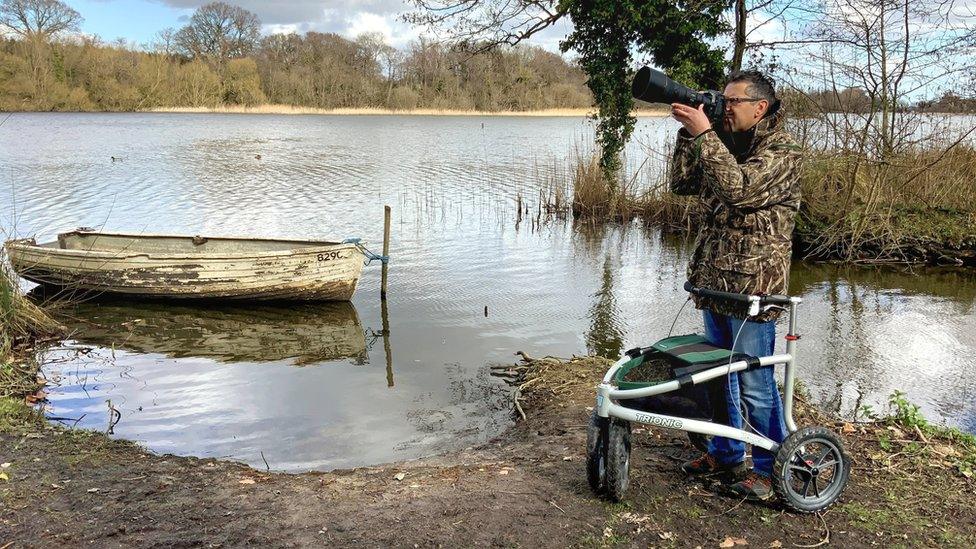
Jon Kelf says watching and photographing wildlife help takes his mind off the symptoms of Stiff Person Syndrome
When Celine Dion revealed she had Stiff-Person Syndrome (SPS) and was postponing her tour, it was the first time many people had heard of the rare neurological disorder. For Jon Kelf, it was an emotional moment as the world learned about the incurable condition he has lived with for three years. Here in his own words, he describes what it is like to have SPS and how he finds comfort in nature, photography and a vole called Vernon.

Something wasn't right. My legs weren't working properly. They stiffened up in situations when I wasn't comfortable.
I put it to the back of my mind; I'd had major chest surgery - my third - to remove a tumour, followed by radiotherapy, and I thought it may be connected to that.
One particular day, in 2019, everything was normal. I'd been out with my camera to a nature reserve, got home, had lunch.
When I got up, my leg just brushed the side of the settee and it seized up, I dropped down and hit my head, cutting it open and knocking myself unconscious.
I went to hospital to be checked out, and when I got home I couldn't get out of bed, I couldn't move my arms or legs.
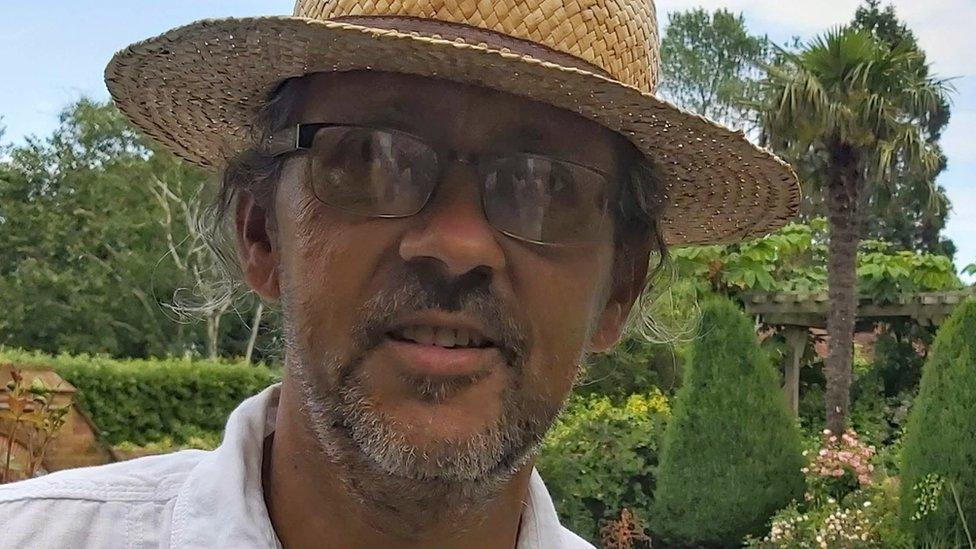
Jon was recovering from major surgery and cancer treatment when he was diagnosed with SPS
I didn't know what was happening, I couldn't even get into a wheelchair and it affected my eyes, too - my vision was blurred and the room was spinning. My legs were going into spasm.
The hospital ruled out a lot of things with blood tests and then the neurologist said it could be Stiff Person Syndrome, although it was unlikely because it's so rare.
The neurologist himself had never seen it. It was the last possible thing it could be. They drained some spinal cord fluid and found a high level of antibodies that are found in people with SPS.

What is Stiff-Person Syndrome?
SPS is a very rare condition and not well understood.
According to the National Institute for Neurological Disorders, external, it is characterised by "fluctuating muscle rigidity in the trunk and limbs and a heightened sensitivity to stimuli such as noise, touch, and emotional distress, which can set off muscle spasms".
"Abnormal postures, often hunched over and stiffened, are characteristic of the disorder," they also note.
"People with SPS can be too disabled to walk or move, or they are afraid to leave the house because street noises, such as the sound of a horn, can trigger spasms and falls.
"Most individuals with SPS have frequent falls and, because they lack the normal defensive reflexes, injuries can be severe."
While there is no cure for SPS, there are treatments - including anti-anxiety medicines and muscle relaxants - that can slow down its progression.
The Genetic and Rare Disease Information Center, external estimates fewer than 5,000 people have the condition in the US, a country with a population of 331.9m.

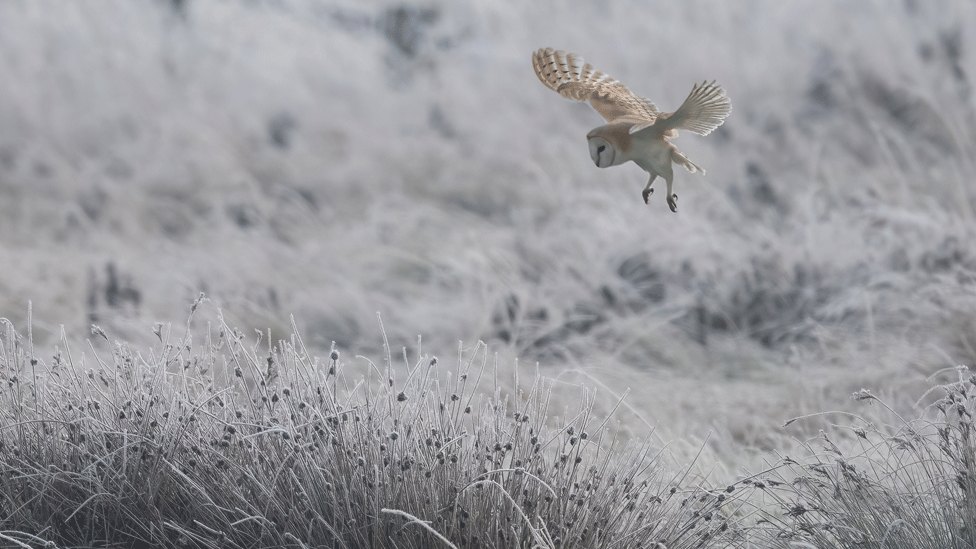
The recent cold snap did not make Jon's symptoms worse and he was thrilled to see this barn owl
I also had other SPS symptoms; I was so sensitive to touch. Even the slightest touch with the hammer on my knee to test my reflexes and my leg would shoot up. It was so reactive, it was off the scale.
I was diagnosed extremely quickly. Some people wait months or years, because it can look like other things [including Multiple Sclerosis (MS) and Parkinson's disease].
I had never heard of it. I found an online support group for people with SPS, external, which has been really helpful. I've never met anyone with this, but I can talk to people with it, from all over the world.
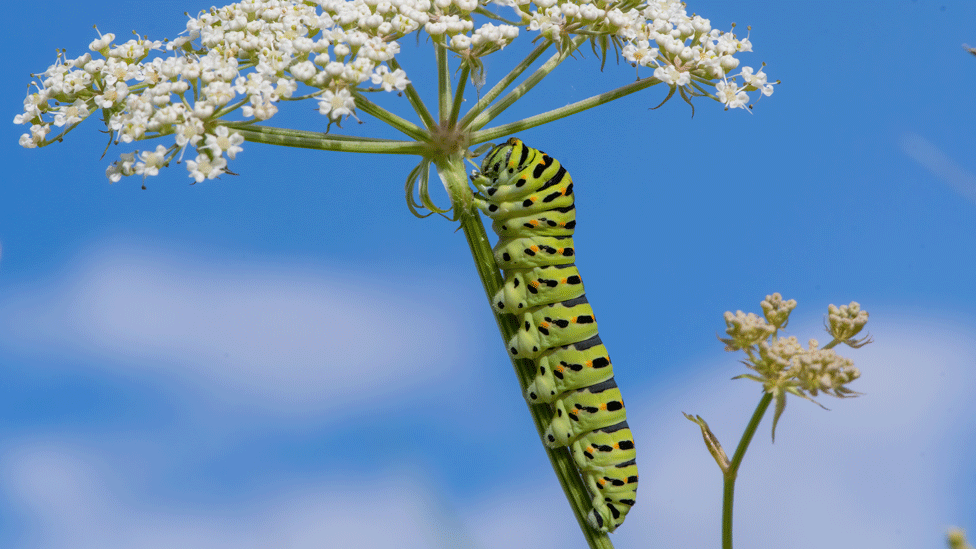
Jon says the Norfolk countryside offers great opportunities to distract him from his symptoms
The doctors tried me on a few treatments and once they got me on the right medication it was life-changing. It calms me and controls the symptoms. Before taking it, I would fall down all the time.
I 'furniture surf' around the house, holding on to things... I have my crutches and my walker; I did not want to get used to a wheelchair and lose my strength. I used to run marathons [until 2012], and I think once you have that strength there it stays with you.
The thing with SPS is, it's so unexpected.
I tend to avoid situations which make me stressed or nervous and uncomfortable. I've only been to a supermarket two or three times, and only when it was quiet.
Allow Instagram content?
This article contains content provided by Instagram. We ask for your permission before anything is loaded, as they may be using cookies and other technologies. You may want to read Meta’s Instagram cookie policy, external and privacy policy, external before accepting. To view this content choose ‘accept and continue’.
Anywhere busy, there is more chance of it happening. Someone walking around a corner might startle me and my legs stiffen up.
That's why it's so strange - you could be able to walk normally, albeit with crutches, then a little something happens and you can't. It's really hard to explain.
I was recently using my crutches [on a shopping street], and I could see a woman ahead of me. I knew I'd have to get round her and it put me on edge, which can trigger my symptoms.

Jon will sit for long periods on his walker, waiting to capture the perfect shot
She saw me and moved out of my way, but just after that a van sounded its horn, right next to me. I suddenly froze. I was right next to something I could hold on to, if not I'd have gone over.
That stiffness is always present, but I've learned how to deal with it. It's a fine balance.
I live on the Norfolk Broads so I'm surrounded by so many wonderful places within a five or 10 minute drive.
While I couldn't go out - because of my symptoms, and then Covid lockdown - I'd just sit on the patio and take pictures of Vernon, a vole who comes into the garden.
In some ways he's been quite a big help for me. I know he's there.
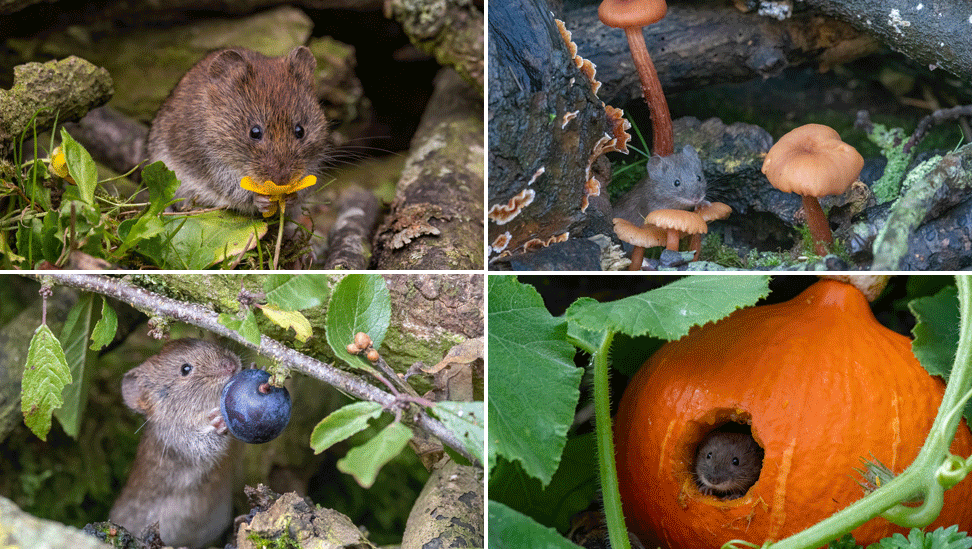
Jon does not have to venture far to watch Vernon
If I am working from home, I might have a moment out there with a cup of tea and get a few images of him. He's always a reliable model.
It's just pure enjoyment watching him, and the way his expression changes and the way he reacts to something I put out for him, like a flower or a piece of fruit. It makes you feel good, and you don't think about all the rubbish.
My partner Dawn and I were on the Broads when we saw an otter. Usually they disappear quite quickly, but we were there for 15 minutes, just watching it fishing and eating and then it stuck its tongue out at us.
There have been loads of moments like that. It's wonderful.
I have a lot of empathy for Celine Dion - you could see how emotional she was in her video, talking about it. It is so difficult when you are first diagnosed.

The singer said she had not been ready to talk about her disorder until now
It was quite emotional for me. I thought 'maybe more people will become aware of it', because people had never heard of it.
However experienced a performer you are, they all get nervous before they go on stage and that is exactly what can cause symptoms, so who knows if she will tour again.
People always say to me 'you've been through it', but I think I am extremely lucky, as I could be a whole lot worse, and I am here, living life."
As told to Laura Devlin

Find BBC News: East of England on Facebook, external, Instagram, external and Twitter, external. If you have a story suggestion email eastofenglandnews@bbc.co.uk, external
Related topics
- Published13 August 2014

- Published16 December 2013

- Published10 February 2013
